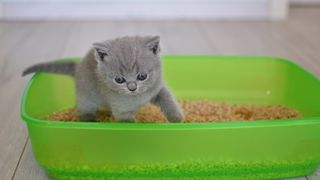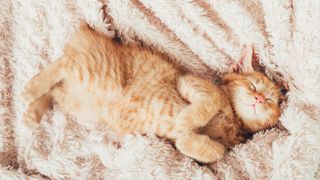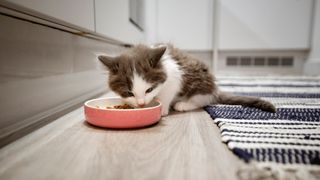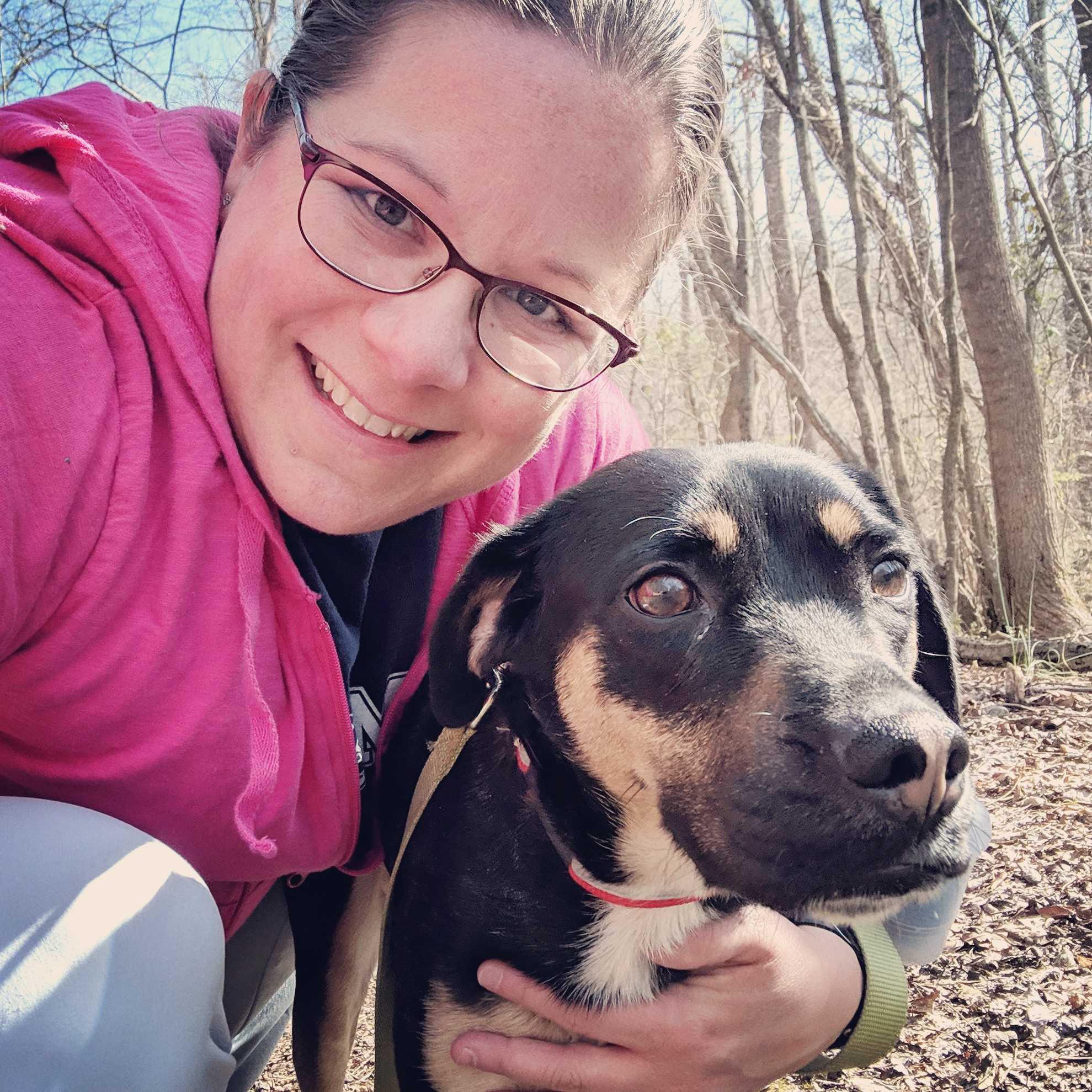Why does my kitten have diarrhea?
'Why does my kitten have diarrhea?' There are many potential causes of gastrointestinal issues in kittens, any of which can leave pet owners asking this

'Why does my kitten have diarrhea?' is a relatively common question in veterinary practices, and it’s one with a wide variety of potential answers.
There are many causes of kitten diarrhea, ranging from intestinal infections to dietary sensitivities. Some cases of diarrhea are preventable, with proper veterinary care and nutrition. Other cases of diarrhea, however, can occur despite proactive care and the best kitten food.
Read on to learn more about possible causes of kitten diarrhea, how you can reduce your kitten’s risk of diarrhea, and how to address this condition if it does occur.
Should I be worried if my kitten has diarrhea?
When you see loose stool in the litter box or your kitten has a bowel movement outside their box, it’s natural to be concerned. Kitten diarrhea is typically stinky; most cat owners want to put a stop to it quickly, to avoid messes and odors within their home. And, while it’s only natural to worry about your home, you’re also probably worried about your kitten. We want our pets to be healthy, and diarrhea can be a very visible sign that your kitten is not feeling well.
Severe or persistent diarrhea warrants a visit to your veterinarian. Your veterinarian can identify and treat the underlying cause of the diarrhea, while also providing supportive care to prevent dehydration and other complications of diarrhea. However, not all episodes of diarrhea require immediate veterinary care.
When determining how worried to be, and how urgently you will need to seek veterinary care, there are a few factors to consider:
- Frequency: Has your kitten had a single soft bowel movement or have there been multiple episodes of diarrhea? A single episode of diarrhea isn’t necessarily concerning, but repeated episodes warrant a veterinary visit.
- Duration: How long has the diarrhea been occurring? One day of diarrhea could indicate that your kitten ate something that didn’t agree with their stomach. Diarrhea that persists over several days is more likely to suggest an underlying medical cause, and can also pose a greater dehydration risk for your kitten.
- Consistency: Is your kitten’s stool just a bit on the soft side, or is your kitten producing large amounts of watery feces? The higher the liquid content of your kitten’s diarrhea, the more urgent it is to address the issue before your kitten becomes dehydrated.
- Presence of other signs: Is your kitten vomiting, refusing food and water, acting lethargic, or showing other signs of illness? If so, your kitten should be seen by a veterinarian as soon as possible. If your kitten is happy, playful, eating well, and showing no other signs of illness, it may be okay to monitor your kitten for 24 hours and see if their diarrhea resolves on its own.
Frequent, severe, watery diarrhea accompanied by other signs of illness should receive veterinary treatment as soon as possible. This may mean visiting a veterinary emergency clinic, if it is outside of your veterinarian’s normal office hours.
In contrast, a single episode of soft stool in an otherwise healthy kitten can probably be monitored at home. Veterinary care may only be needed if the diarrhea recurs or the kitten begins to show other signs of illness.

Why does my kitten have diarrhea?
Sudden diet changes in kittens are a common cause of diarrhea. If you recently adopted your kitten and are feeding a different diet than they were eating with their breeder or at the shelter, this could potentially be a cause of your cat’s soft stools. Diarrhea that is associated with a diet change is often relatively mild, and will resolve within a few days as your kitten becomes acclimated to their new food.
Diarrhea that is persistent or severe, however, requires veterinary attention. Your veterinarian will begin by performing a thorough physical exam, palpating (feeling) your kitten’s abdomen and assessing their hydration status. Next, your veterinarian will perform fecal testing to look for intestinal parasites. Depending on the severity of your kitten’s diarrhea and other clinical signs that may be present, your veterinarian might also recommend bloodwork and other diagnostic testing.
Potential causes of kitten diarrhea include:
- Intestinal parasites: Hookworms and roundworms are common in kittens, and can be acquired during pregnancy or nursing. All kittens should be treated with dewormer every 2-3 weeks, to reduce the risk of these intestinal parasites. If your kitten has not received regular deworming, intestinal worms are a likely cause of diarrhea.
- Protozoal infections: Protozoal infections, such as Coccidia, Giardia and Tritrichomonas, can cause intestinal inflammation and diarrhea in kittens.
- Viral infections: Kittens are susceptible to a number of viruses that can cause diarrhea, including panleukopenia, feline coronavirus, feline rotavirus, feline leukemia virus, and feline immunodeficiency virus.
- Bacterial infections: A number of bacteria, such as Salmonella, Clostridia, and Campylobacter, can be associated with diarrhea in kittens.
While many cases of kitten diarrhea are due to these common infections, other factors may also be at play. Dietary insensitivities, toxin exposure, congenital defects, environmental stress and other underlying causes may also play a role in kitten diarrhea.
Can kitten diarrhea go away on its own?
Diarrhea in a newly-adopted kitten may be associated with environmental stress and a sudden diet change. If the diarrhea is mild and your kitten is not showing any other signs of illness, this diarrhea may resolve on its own.
In many cases, however, kitten diarrhea is associated with an infection or other underlying medical condition. Your veterinarian will perform a thorough workup to determine the cause of your kitten’s diarrhea, then recommend an appropriate treatment to address the condition.
How can I prevent my kitten from getting diarrhea?
The two most important things that you can do to prevent diarrhea are to minimize dietary changes and ensure that your kitten receives regular veterinary care.
Sudden diet changes are a common cause of diarrhea, in both kittens and adult cats. Make dietary changes slowly and gradually, over a period of seven to 10 days. On the first day, add just a small amount of your kitten’s new diet to the food they were previously eating. Gradually increase the quantity of new food while decreasing the quantity of their previous diet, aiming to feed a 50/50 mix of their old/new food by day three to five. Continue this gradual transition, until your kitten is eating exclusively their new food after seven to 10 days.
Veterinary care also plays a key role in reducing kitten diarrhea. Your kitten should see a veterinarian approximately every three weeks from the time they are six weeks old until they reach 16 weeks of age. At these veterinary visits, your veterinarian will check your kitten for intestinal parasites and administer a broad-spectrum dewormer. Your veterinarian will also administer vaccines that protect against many causes of kitten diarrhea.
By regulating your kitten’s diet and keeping them up-to-date on preventative veterinary care, you can significantly reduce your kitten’s risk of diarrhea.

If you find yourself asking “why does my kitten have diarrhea?,” it’s probably time for a trip to the veterinarian. Unless there’s an obvious cause for your kitten’s diarrhea, such as a sudden dietary change or a dramatic change in environment, a veterinary workup will be needed to diagnose the underlying cause of your kitten’s diarrhea.
Once a diagnosis is obtained, your veterinarian can recommend an appropriate course of treatment for your kitten.
PetsRadar Newsletter
Get the best advice, tips and top tech for your beloved Pets
Dr. Barnette is a graduate of the University of Florida, where she received both her B.S. in Zoology and her Doctor of Veterinary Medicine (DVM). She has 15 years of clinical experience as a small animal veterinarian, treating dogs, cats, and occasional exotic patients. She now works as a freelance veterinary writer, creating educational content for veterinarians, veterinary team members, and dedicated pet owners. Dr. Barnette lives in southwest Florida with her husband and daughter (plus two cats, a dog, and a rescued dove!) and enjoys kayaking, biking, and hiking. Learn more about Dr. Barnette at www.linkedin.com/in/catherinebarnette.

